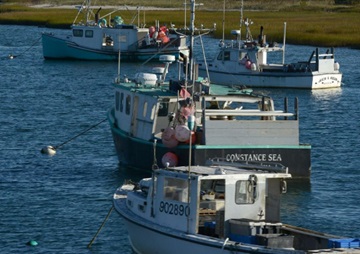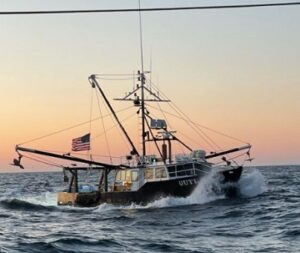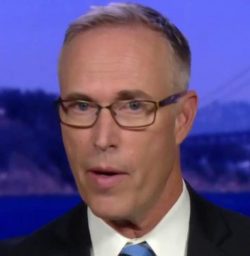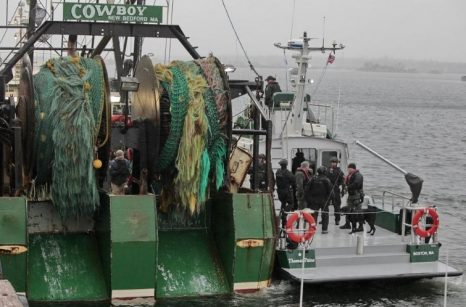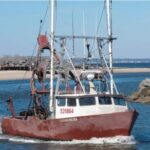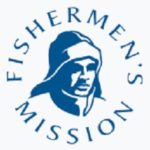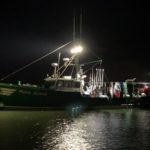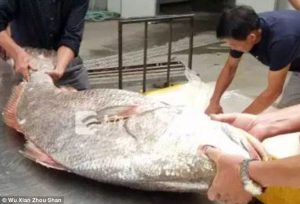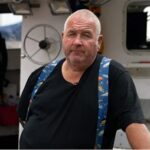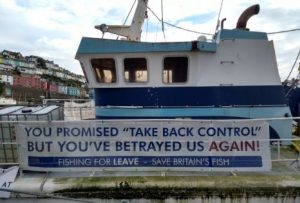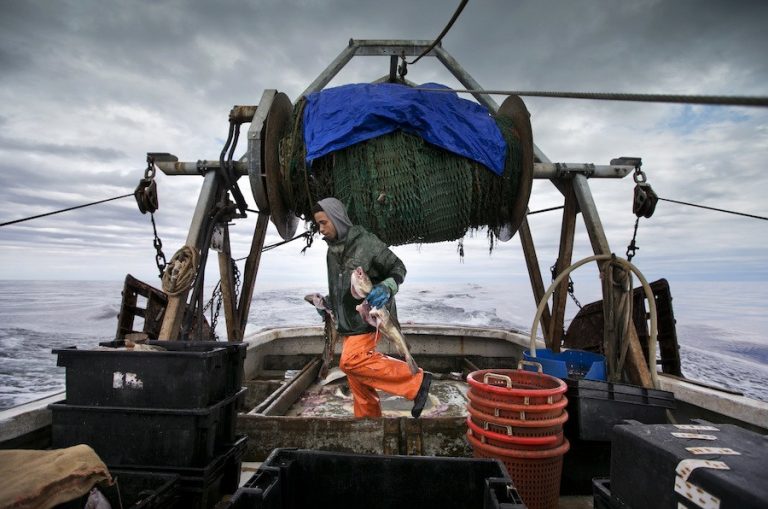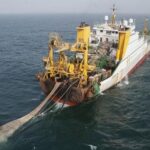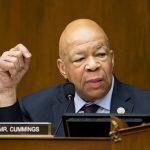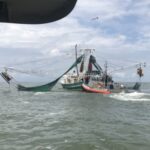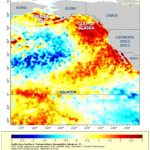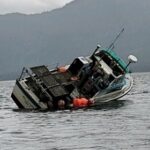Tag Archives: John Pappalardo
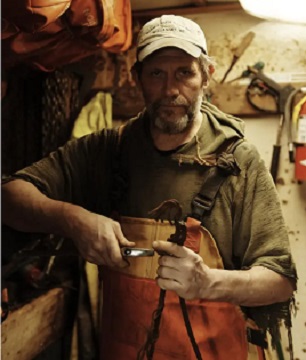
How foreign private equity hooked New England’s fishing industry
The 85-foot trawler, deep green and speckled with rust, was returning from a grueling fishing trip deep into the Atlantic swells. As sunrise broke over New Bedford harbor, the fish were offloaded in plastic crates onto the asphalt dock of Blue Harvest Fisheries, one of the largest fishing companies on the East Coast. About 390 million pounds of seafood move each year through New Bedford’s waterfront, the top-earning commercial fishing port in the nation. Leeman and his crew are barely sharing in the bounty. On deck, Leeman held a one-page “settlement sheet,” the fishing industry’s version of a pay stub. Blue Harvest charges Leeman and his crew for fuel, gear, leasing of fishing rights, and maintenance on the company-owned vessel. Across six trips in the past 14 months, Leeman netted about 14 cents a pound, and the crew, about 7 cents each — a small fraction of the $2.28 per pound that a species like haddock typically fetches at auction. Photos, >click to read< 12:04
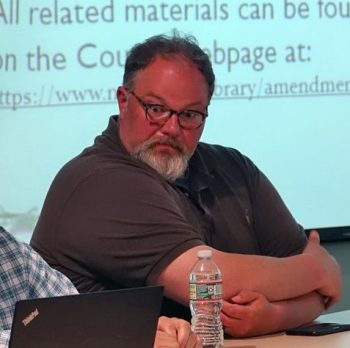
Final stretch for herring protections
“After 10 years of debate, the New England Fishery Management Council has finally accepted the proposals favored by Cape communities and what would keep midwater trawls off our coast year round. It will have benefits for all our commercial and recreational fisheries and the nearshore ecosystem,” said John Pappalardo, chief executive officer of the Chatham-based Cape Cod Commercial Fishermen’s Alliance, which has worked to advance the rules. “This is it,” said Pappalardo. “We need people to speak out for herring one more time to make sure these important rules become a reality.” >click to read< 19:55
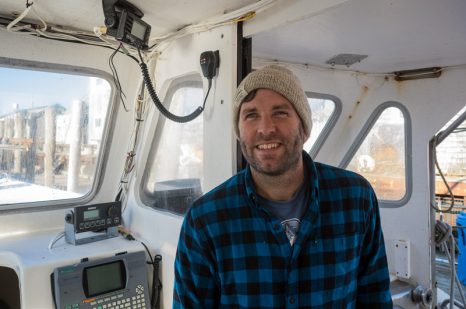
“It’s a symptom of poor policy”- Codfather Arrest Shines Light on Fishing System
Members of the dwindling Vineyard fishing community who have been watching the proceedings say the tale is a sad commentary on the state of the industry and highlights flaws in its regulation. “It’s a symptom of poor policy,” said Wes Brighton, a Vineyard fisherman and one of the only Islanders to hold a federal commercial groundfishing permit. Mr. Brighton fishes for lobster, conch, monkfish, and some cod from his boat Martha Elizabeth. The system creates an imbalance, he said, giving independently-owned family fishing businesses little access to the fisheries and allowing larger corporations the ability to consolidate fishing permits and quota. click here to read the story 08:49
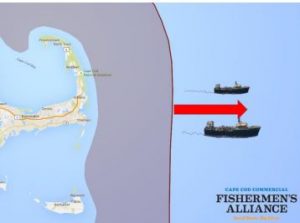
Cape and Islands Lawmakers Join Fight to Protect Offshore Herring
The Cape Cod Commercial Fishermen’s Alliance is receiving support from the Cape and Islands legislative delegation in protecting offshore herring for local fishermen. Earlier this month, the lawmakers called on the New England Fishery Management Council to create a buffer zone off the coast of the Cape and Islands from large-scale mid-water herring trawlers. Current regualtions allow the trawlers to fish three miles offshore from Provincetown past the Islands. click here to read the story 13:34
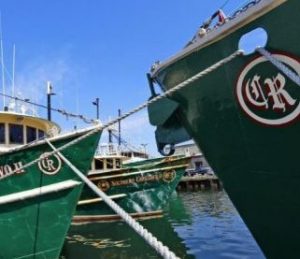
NOAA Bans Rafaels Vessels from Groundfishing
Calling its actions “unprecedented” NOAA announced Monday that Carlos Rafael’s vessels are banned from catching groundfish for the foreseeable future. The government agency also said the vessels currently at sea on a groundfish trip must return to port, where they will be allowed to unload and sell their catch. click here to read the story 13:11
Fishing fleet dominated by ‘Codfather’ grounded – Jailed New Bedford fishing mogul Carlos Rafael’s empire, once one of the largest fish businesses in the country, continues to crumble. click here to read the story 13:31
What’s next for Carlos Rafael’s fishing permits?
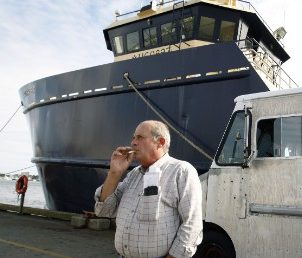 New Bedford – Almost a week ago, City Council members asked for their names to be attached to a late file agenda pertaining to Carlos Rafael’s groundfish permits. Behind Ward 4 Councilor Dana Rebeiro, Council President Joseph Lopes and Ward 5 Councilor Kerry Winterson, the council requested “that the Committee on Internal Affairs meet with Attorney General Maura Healey and NOAA to discuss how current owners and mariners operating in New Bedford have the first right of refusal to acquire licenses to be auctioned as result of the plea agreement in the case of The United States vs. Carlos Rafael… The written motion was a bit premature. Following Thursday’s council meeting, Rebeiro acknowledged the measure was “to get ahead of the ball” in terms of where the permits may land. So what’s next? click here to read the story 19:11
New Bedford – Almost a week ago, City Council members asked for their names to be attached to a late file agenda pertaining to Carlos Rafael’s groundfish permits. Behind Ward 4 Councilor Dana Rebeiro, Council President Joseph Lopes and Ward 5 Councilor Kerry Winterson, the council requested “that the Committee on Internal Affairs meet with Attorney General Maura Healey and NOAA to discuss how current owners and mariners operating in New Bedford have the first right of refusal to acquire licenses to be auctioned as result of the plea agreement in the case of The United States vs. Carlos Rafael… The written motion was a bit premature. Following Thursday’s council meeting, Rebeiro acknowledged the measure was “to get ahead of the ball” in terms of where the permits may land. So what’s next? click here to read the story 19:11
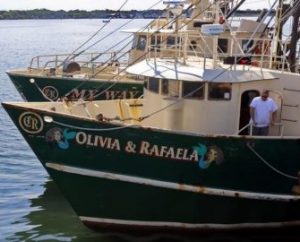
New Bedford among crowd staking claim to Carlos Rafael’s permits
Before Carlos Rafael uttered the word “guilty” last month, the judge made the New Bedford fishing mogul aware of the possibility of forfeiting his assets, which means permits, too. About two months remain before Rafael’s sentencing date, but cities and states have started to acknowledge that possibility as well. “The goal for me is to get ahead of the ball to make partnerships with people that have the same interests, which is keeping the licenses local,” Ward 4 Councilor Dana Rebeiro said. John Pappalardo and Maggie Raymond, the executive director of Associated Fisheries of Maine, expect the status of Rafael’s permits to be decided on the sentencing date. Still, Raymond is already lobbying for any forfeited permit to go to Maine. click here to read the story 08:16
Cape fishermen and environmentalists push to protect herring stocks from “Localized Depletion”
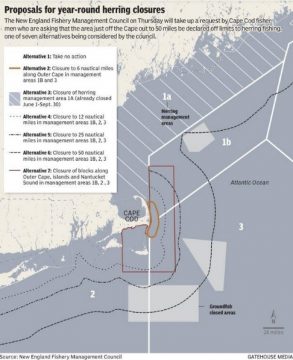 Local fishermen are hoping the New England Fishery Management Council will help protect tuna and other fisheries from the herring fleet by agreeing to have measures asking for year-round closures of up to 50 miles east of the Cape analyzed and included during a vote expected later this year. The council is meeting in Mystic, Connecticut, today through Thursday, when the board will work on herring regulations. “There’s a strong feeling that fisheries that used to happen here have been displaced by 10 years of intense herring removal,” said John Pappalardo, executive director of the Cape Cod Commercial Fishermen’s Alliance, and a member of the New England council and its herring committee. “The haddock resource is robust, but there’s no meaningful haddock fishery close to shore.” Localized Depletion. Are they not considering that with the squid fishery too? Oh yes they are! click here to read the story 08:08
Local fishermen are hoping the New England Fishery Management Council will help protect tuna and other fisheries from the herring fleet by agreeing to have measures asking for year-round closures of up to 50 miles east of the Cape analyzed and included during a vote expected later this year. The council is meeting in Mystic, Connecticut, today through Thursday, when the board will work on herring regulations. “There’s a strong feeling that fisheries that used to happen here have been displaced by 10 years of intense herring removal,” said John Pappalardo, executive director of the Cape Cod Commercial Fishermen’s Alliance, and a member of the New England council and its herring committee. “The haddock resource is robust, but there’s no meaningful haddock fishery close to shore.” Localized Depletion. Are they not considering that with the squid fishery too? Oh yes they are! click here to read the story 08:08
You can listen to all the council action by clicking these links. To read the final agenda, click here Register click here to listen live via webinar.
House Bill Aims to Help Young People Enter Commercial Fishing Industry
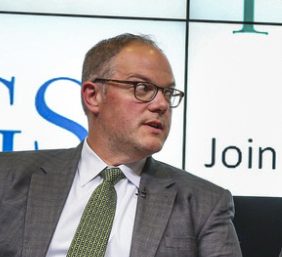 A bipartisan bill has been introduced by the House of Representatives to establish the first national program to help young men and women enter the commercial fishing industry. The legislation, introduced by Congressmen Seth Moulton (D-MA) and Don Young (R-AK), would provide up to $2 million a year in grant funding through NOAA’s Sea Grant Program. “This bill is designed to allow the next generation of fishermen, or people who want to get into the fishing industry, to receive training to become successful businessmen or women,” said John Pappalardo, the CEO of the Cape Cod Commercial Fishermen’s Alliance. Representatives from the Alliance will head to Washington D.C. later this month to join other groups from the Fishing Communities Coalition to lobby lawmakers. “We will be walking Capitol Hill for a couple of days talking about this bill,” Pappalardo said. click here to read the story 16:26
A bipartisan bill has been introduced by the House of Representatives to establish the first national program to help young men and women enter the commercial fishing industry. The legislation, introduced by Congressmen Seth Moulton (D-MA) and Don Young (R-AK), would provide up to $2 million a year in grant funding through NOAA’s Sea Grant Program. “This bill is designed to allow the next generation of fishermen, or people who want to get into the fishing industry, to receive training to become successful businessmen or women,” said John Pappalardo, the CEO of the Cape Cod Commercial Fishermen’s Alliance. Representatives from the Alliance will head to Washington D.C. later this month to join other groups from the Fishing Communities Coalition to lobby lawmakers. “We will be walking Capitol Hill for a couple of days talking about this bill,” Pappalardo said. click here to read the story 16:26
Mainer Mary Beth Nickell-Tooley’s vote disallowed on NEFMC, What about John Pappalardo’s?
 Mary Beth Nickell-Tooley, an at-large member from Maine since 2008, was informed Wednesday by NOAA Attorney Adviser Mitch MacDonald she “may not vote during the Council’s final deliberations on Habitat Amendment alternatives that open or close areas to fishing nor on the final vote to approve the Habitat Amendment for submission to NMFS.” Nickell-Tooley’s recusal served as a backdrop for another inquiry from , who operates the Saving Seafood website, whether council member John Pappalardo should have received a similar order for recusal. Read the rest here 08:45
Mary Beth Nickell-Tooley, an at-large member from Maine since 2008, was informed Wednesday by NOAA Attorney Adviser Mitch MacDonald she “may not vote during the Council’s final deliberations on Habitat Amendment alternatives that open or close areas to fishing nor on the final vote to approve the Habitat Amendment for submission to NMFS.” Nickell-Tooley’s recusal served as a backdrop for another inquiry from , who operates the Saving Seafood website, whether council member John Pappalardo should have received a similar order for recusal. Read the rest here 08:45
John Pappalardo has submitted paperwork to replace Nature Conservancy’s Tom Dempsey on NEFMC

 Pappalardo already has served on the council for three terms, serving five years as chairman, during which the New England fishery experienced big changes in management. Under a plan crafted by the council, fishermen were allotted a share of the overall quota of each groundfish stock based on their fishing histories. They then formed cooperatives that managed the combined quota. Read the rest here 08:34
Pappalardo already has served on the council for three terms, serving five years as chairman, during which the New England fishery experienced big changes in management. Under a plan crafted by the council, fishermen were allotted a share of the overall quota of each groundfish stock based on their fishing histories. They then formed cooperatives that managed the combined quota. Read the rest here 08:34
Some Dangerous People will Assemble on September 10, 2014, and you should be aware of this.
 Casting the Net: A More Efficient Approach to U.S. Fisheries Management – The Brookings Institution – Former U.S. Treasury Secretary Robert E. Rubin will open the forum. discussion paper by economist Christopher Costello of the University of California, Santa Barbara, joined by Lee Crockett, Director of U.S. Oceans at the Pew Charitable Trusts; Amanda Leland, Vice President of Oceans at the Environmental Defense Fund; John Pappalardo, Executive Director of the Cape Cod Commercial Fisherman’s Alliance; and Captain Steve Tomeny of Steve Tomeny Charters. Read this. Read the rest here 20:22
Casting the Net: A More Efficient Approach to U.S. Fisheries Management – The Brookings Institution – Former U.S. Treasury Secretary Robert E. Rubin will open the forum. discussion paper by economist Christopher Costello of the University of California, Santa Barbara, joined by Lee Crockett, Director of U.S. Oceans at the Pew Charitable Trusts; Amanda Leland, Vice President of Oceans at the Environmental Defense Fund; John Pappalardo, Executive Director of the Cape Cod Commercial Fisherman’s Alliance; and Captain Steve Tomeny of Steve Tomeny Charters. Read this. Read the rest here 20:22
Editorial: Witness list shows Magnuson-Stevens Act talks a sham from start
![]() So, you’d like to think that New England will be well represented at these hearings, right? Wrong. The only scheduled New England witness scheduled to speak before the House Natural Resources Committee, where Malden Congressman and U.S. Senate candidate Ed Markey is the ranking Democrat, is John Pappalardo of the Cape Cod Hook Fishermen’s Association. And that’s a shameful affront not only to rank-and-file fishermen in Gloucester and beyond, but at slap at our fishing communities, as well. continued
So, you’d like to think that New England will be well represented at these hearings, right? Wrong. The only scheduled New England witness scheduled to speak before the House Natural Resources Committee, where Malden Congressman and U.S. Senate candidate Ed Markey is the ranking Democrat, is John Pappalardo of the Cape Cod Hook Fishermen’s Association. And that’s a shameful affront not only to rank-and-file fishermen in Gloucester and beyond, but at slap at our fishing communities, as well. continued






